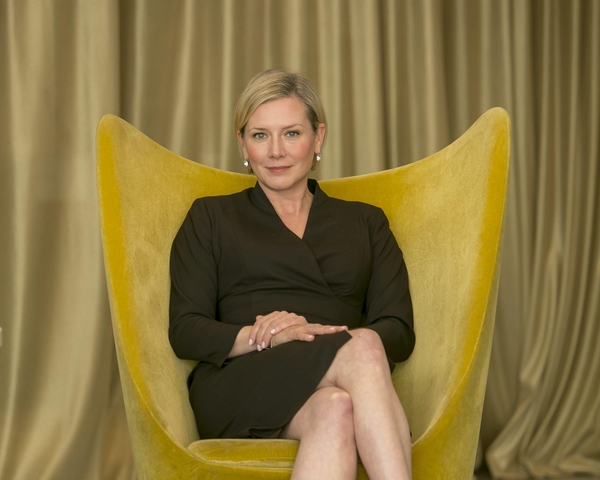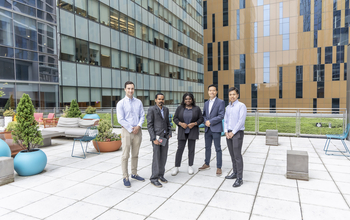Three months into the job, Tif's first 90 days have been unlike any other past President & CEO. Perhaps most significantly, she's spent most of that time leading the organization via Zoom, Microsoft Teams and the host of other video platforms that have defined our daily interactions for the better part of a year. But as we've learned over the last several months, when Tif's ambition is in the right place, her physical location is only a detail. And as she continues immerse herself in Philadelphia’s community, culture and life sciences industry, the Science Center and the region will stand to benefit even more.
We sat down with Tif (virtually) for a discussion about the Science Center's role in the current healthcare and economic crises, her leadership philosophies and the magazine that inspired her curiosity as a kid. Read on to learn where she's leading the Science Center and how she's meeting the moment.
You interviewed and were hired during the midst of the pandemic. Since then, the spread of COVID-19 has increased and significantly limited our ability to interact with others. How, if at all, does this moment influence your priorities for the Science Center’s future?
At a very high level, while COVID has not significantly influenced my strategic priorities for the Science Center, it has expedited several of them. Issues around adoption of digital health technologies, the importance of cybersecurity and new methods of communication have all impacted how we will be investing our time in 2021.
The pandemic has reinforced how the Science Center can affect greater impact. The covers have been pulled back on the economic disparities in Philadelphia and across communities around the country and we can’t run away from it. The commercialization of digital health technologies will help address healthcare disparities in the short term. We’ve got a mechanism for launching, accelerating growth of digital health technologies. We have space for them to launch and scale. If we know at an early stage how fast they’ll grow, we can train a local workforce and help facilitate those connections. If we do that right, we can make healthcare more accessible and economically empower Philadelphians.
Operationally, my focus is to ensure our team stays healthy – physically and emotionally – and ensure we can all be under the same roof again when it’s safe to do so. The light is at the end of the tunnel now that vaccine distribution has started.
A silver lining of our current reality is that I’ve been able to meet a lot of people in a short period of time without the constraints of travel. I certainly look forward to in person interactions in the future – and believe we as humans will all appreciate that social connection again, but in the meantime, we do what we need to do to keep things moving forward.

Along the same lines, how has your experience of getting to know the team been given the virtual nature of doing business this year?
We are all in the same boat and learning how to do our work in this environment and get to know each other virtually. I have been able to spend some time in Philadelphia and have held some masked, socially distanced meetings which has helped the transition. Although we have limited ability to interact with others in person, there has been broad adoption of virtual technologies which while not ideal, is enabling us to have those introductory meetings and keep the ball rolling.
You launched and led an organization with similar roots as the Science Center in that it was focused on commercializing promising medical device and digital health technologies. What are some of the major differences you see in these organizations and your role as the President & CEO?
GCMI was launched as a 501(c)(3) nonprofit organization that became an affiliate of Georgia Tech. Unlike the Science Center, the organization didn’t have broad representation from the region’s shareholders from the onset.
There was no playbook for GCMI, it was a concept that we built from the ground up. We were focused on analyzing where the gaps were in order to move innovation from bench to bedside and in doing so, building a team, processes and relationships to help narrow those gaps and have impact. GCMI’s role in the COVID pandemic PPE response demonstrated the value of the investment in the team and concept. Within weeks of receiving a call to help, GCMI translated a Georgia Tech face shield from 3D printed units to scaled manufacturing, enabling millions of units to be shipped across the United States. That knowledge demonstrates how future technologies and startups can be accelerated to market.
Unlike the Science Center, GCMI does not have a real estate portfolio that serves as an endowment to support program activity. Rather, it operates on a fee-for-service for medical device development, testing and training. The COVID experience enabled the organization’s first major gift, a generous $2 million donation from Aflac to supercharge PPE production and distribution capabilities. This highlights the opportunity for diversified income streams to achieve our mission and have a stronger impact.
Both organizations bring a rich ecosystem of expertise, talent and connections to facilitate commercialization of life changing technology. I look forward to integrating those networks to enable new connections.
As President & CEO of Science Center, I am building on a solid foundation, rich history and strong reputation to fulfill its mission at a time where innovation in life sciences and healthcare technology has never been more important. All my experiences to date are really helping shape how I see the future.
As President & CEO of Science Center, I am building on a solid foundation, rich history and strong reputation to fulfill its mission at a time where innovation in life sciences and healthcare technology has never been more important. All my experiences to date are really helping shape how I see the future.
What do you think Philadelphia could learn from Atlanta’s innovation community?
Now is the time to really focus on the strategic, global collaborations that will further drive economic growth across the region.
What is your leadership philosophy?
Leading in the world of innovation and entrepreneurship requires a comfort level with balancing ambiguity with structure. My philosophy can be summarized as having the right people in place, setting a realistic vision that inspires impact, and supporting creative collaborations to achieve goals and objectives – and then allowing the team to do what they do best. I value authenticity, transparency, consistency and a commitment to always doing the right thing.
Leading in the world of innovation and entrepreneurship requires a comfort level with balancing ambiguity with structure.
In a sentence, how would you describe the experience of leading a Philadelphia-based anchor institution from Atlanta?
Welcome to leading during a global pandemic – you do what you need to do to get things done.
Beyond joining the Science Center, what about Philadelphia excites you most?
My family and I are really looking forward to relocating to Philadelphia this year. We are excited to explore the different neighborhoods, restaurants, museums and American history as we make Philly home. I am most excited about the opportunity to roll up my sleeves and collaborate within the life sciences ecosystem and work with community leaders to tackle the challenges around healthcare and economic disparities in Philadelphia.
What is your superpower?
Networking. I love meeting new people with diverse backgrounds and connecting people who should know each other.
Complete the Sentence: “As a curious child..."
I read National Geographic and wondered what it would be like to travel around the world and see how different people live.
Finally, as we’ve witnessed this week, the virus is not the only issue plaguing our country. How do you reconcile this reality as a leader of the Science Center?
We’ve seen throughout the pandemic that the line between personal, professional and civic discourse has blurred. They are very much interwoven and when there are lives, livelihoods and democracy at stake, we can’t ignore it. The work we do at the Science Center in supporting nascent research and startups is analogous to the fragility of our democracy. Democracy is our most profound innovation and like the ventures we support, it must be nurtured, supported and to be successful – embraced.



